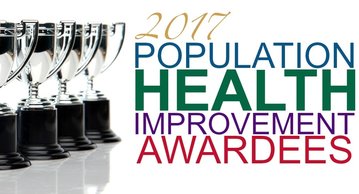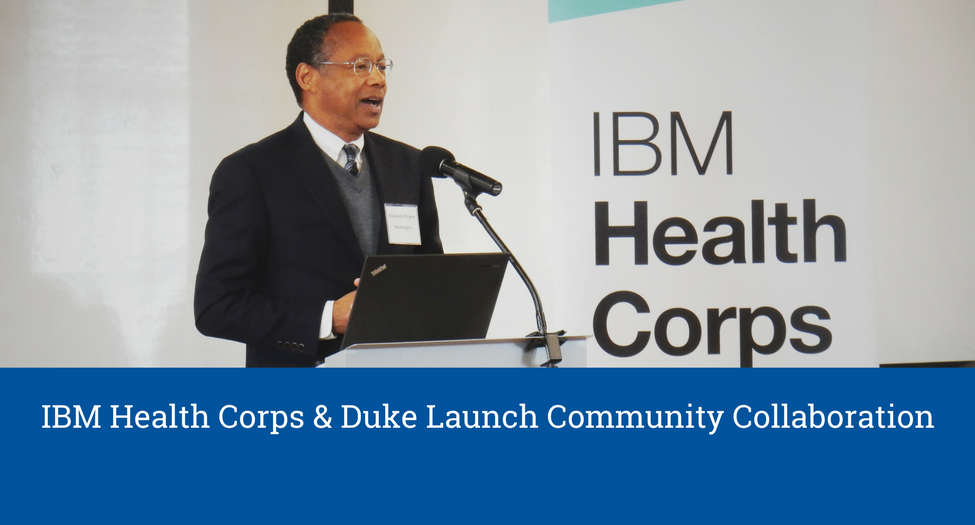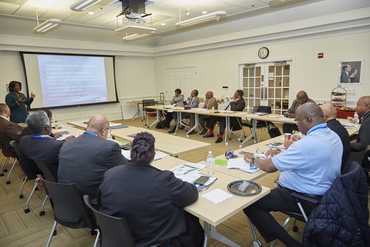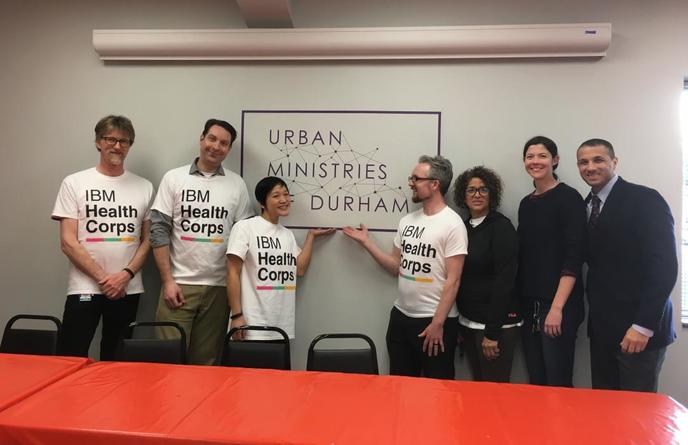|
The Master of Health Sciences in Clinical Leadership (MHS-CL) is offering for faculty/staff two courses for the upcoming fall term, August – November 2017. The courses focus on better understanding population health models of care and leading in complex health care environments – valuables skills to have in today’s ever-changing health care environment. Duke students/trainees are encouraged to apply as well if the topics are of interest to them.
Fall Course descriptions: CLP-214: Population Health Management Approaches This survey course provides an overview of the importance of population health, models of population health management, community and population health improvement, and considerations for evaluation of these efforts. It will give health care professionals a better understanding of concepts such as panel management, care coordination, practice improvement, accountable care communities, and patient/stakeholder engagement along with the systems and tools necessary to develop those models. Participants are encouraged to share population health improvement ideas in order to receive consultation in developing and implementing those initiatives. CLP-204: Leading in a Chaotic Environment In this course, students will examine outlooks on crisis management in turbulent and complex environments and learn how to anticipate and plan for crises by analyzing examples of successful crisis management. The study of leadership theory and practice will also be explored as students examine leadership types and styles, including their own More details about course directors, learning objectives and how to apply can be found here.
1 Comment
 The CTSI Community Engagement Core has awarded Population Health Improvement Awards to four community-research partnership teams. These awards seek to foster community-research collaborations that improve local health. Successful awardees demonstrated a co-developed research process that is mutually beneficial to both the community and research partner, engages the local community in the full spectrum of research, values the expertise of community partners, and facilitates relationships that improve population health. The selected projects, announced this week, are funded for one year beginning in July 2017. The projects awarded for 2017 aim to:
The first project, Testing Two Population Health Surveys for Identifying Socioeconomic Risk Factors in a Community Health Center, is a partnership between Lincoln Community Health Center Chief Medical Officer Howard Eisenson and Duke Professor of Community and Family Medicine George Parkerson. This community-research collaboration received an advanced partnership award to implement two new surveys for assessing social determinants of health at Lincoln Community Health Center, which serves predominantly low-wealth community of mostly racial and ethnic minority patients. After co-developing the best way to identify risk factors, this team’s goal is for a clinical champion for population health to work with internal and community resources to develop strategies for addressing the social determinants found to be most prevalent and causing highest risk for poor health outcomes in the community. Senior PharmAssist founder Gina Upchurch and Duke Investigator Daniel Parker received a co-development award to fund the second project, Connecting Agencies, Practices and Seniors through a Trusted Online Network (CAPSTONe). The team plans to leverage relationships in the community and the momentum of the recent IBM Health Corps work in Durham to help local seniors access the county’s public, private, and nonprofit community-based organizations. The pair recognized a need among community-based organizations for an online referral system to help Durham residents find resources already available to the community. The project will build on OurCareDirect.com, an existing on-line community referral tool created by Daniel Parker, to help older adults and their caregivers in Durham obtain needed resources. If successful, the online tool could then be adapted for other groups in Durham. Kelley Massengale, director of research and evaluation at the Diaper Bank of North Carolina, and Sarahn Wheeler, assistant professor of obstetrics and gynecology, have partnered for the third project, Engaging the Community to Understand and Eliminate Barriers to 17-P for Preterm Birth Prevention in Non-Hispanic Black Women. Massengale and Wheeler have been granted a co-development funding award to conduct focus groups to uncover patients’ perceptions of barriers to following healthcare provider recommendations about 17-P. Their objective is to develop and test clinic- and community-based interventions to increase uptake of prevention therapies for non-Hispanic Black women at high risk for preterm births. Durham Technical Community College Instructor Christine Dove, NCCU Assistant Professor Ruth Phillips, and Duke Center for Research on Personalized Health Care Investigator Connor Drake have partnered for the fourth project, Identifying Opportunities for Prevention in Emerging Adulthood. The period of emergent adulthood (ages 18-30) impacts the brain, social relationships, education, and work, yet little research has been done to assess how institutions of higher education identify and address the health needs of their student populations. This project will build on existing partnerships among Duke, Durham Tech, and NCCU to survey health behaviors and outcomes among students. The project aims to address the issue locally by translating quantitative health data and qualitative interviews with stakeholders into actionable reports for each institution involved in the project to facilitate population health improvement on campus. IBM Health Corps team shares ideas on how to better connect and coordinate Durham’s efforts to make our community healthier Marissa Mortiboy scanned the whiteboard covered with sticky-notes of different colors and considered carefully where to add hers. Walking slowly in front of the long board, she scanned the notes clustered under questions about health care in Durham such as “How do I get access to care?” “How do we get researchers and experts involved?” “What’s working?” Jostling among two dozen representatives from the Durham County Department of Public Health, Partnership for a Healthy Durham, Duke, and other organizations serving the health needs of the local community, she placed her note on the board near a similar concept and continued to scan answers from others. “. . . It became clear that there is a large concerted effort to improve healthcare across the community. . . Clearly, Durham’s challenges are not caused by lack of effort.” The flood of ideas was part of a design thinking workshop held by a seven-member IBM Health Corps team during their three-week visit to Duke in January and February. “It was a fun and effective way to brainstorm because everyone had input,” said Mortiboy, coordinator for the Partnership for a Healthy Durham(link is external). “It reaffirmed that we share common concerns and allowed us to see where we have overlapping goals and resources.” Those common concerns and goals were at the heart of the final report that the IBM Health Corps Team(link is external) brought back to community leaders on Feb. 17, suggesting a possible structure for human and technological resources that could increase coordination among the many organizations striving to improve the health of Durham. Three Intense Weeks The seven members of the IBM Health Corps team arrived in Durham on January 30 from New York, France, Ireland, California, and Ohio to set in motion a process funded by IBM’s new Health Corps award. This program brings together small teams of IBMers who dedicate three weeks to provide pro bono consulting expertise to a community in an effort to address disparities in health. Duke Health was one of five institutions selected for the inaugural year of IBM Health Corps, and the only institution selected in the U.S.A. In total, the program provides over $2.5 million worth of public health-related benefits to the chosen communities. During their three weeks in Durham, the team interviewed 32 local organizations and leaders in the community, made site visits to large organizations such as the Lincoln Community Health Center and small non-profits such as the Diaper Bank of North Carolina, attended three meetings with committees from the Partnership for a Healthy Durham, and hosted several roundtable and design thinking workshops. The team came away with a heartfelt appreciation for the level of commitment to improving health in Durham. “There are large disparities in wealth and health outcomes in Durham County,” says Jason Gilder, PhD, a member of the IBM Health Corps team whose regular job is senior director of analytics and informatics at IBM Watson Health in Cleveland. “However, it became clear that there is a large concerted effort to improve healthcare across the community. . . Clearly, Durham’s challenges are not caused by lack of effort.” Harnessing Technology
To better harness that effort, the team recommended a combination of technology and human power. They noted that during the three-week visit they found that many organizations working to improve health in Durham were unaware of the efforts of other groups. “For a short time, we acted as human glue in the community, introducing and matching people,” said Caroline Lu, whose regular job is with IBM Watson Commerce in New York. The team demonstrated how to leverage technology to improve information sharing among organizations, linking clinical care providers and organizations tackling other issues that affect health, such as housing, access to healthy food, mental health, and medication adherence. Such a technology platform could provide a centralized, searchable database of services offered. It could also create a feedback loop for organizations to let each other know whether patients referred to one service had followed through with the referral. Ideally, the platform could also link to other available non-health data such as public transportation maps, census data, and locations of grocery stores and fast food restaurants – all items that can influence population health. By tying together information from various organizations, Durham leaders would be better able to see where to focus attention, and to track whether programs are actually improving health. The team recommended using the platform to create community care plans, the macro analogy of an individual care plan. Users of the platform would be able to see areas of need, areas of strength, who is doing what, and who is missing from the conversations. Ultimately, this information could be used to increase the impact of individual organizations and improve community health. Lastly, the IBM Health Corps team noted that any such technology requires a clear governance body. This body could decide issues such as what data can and should be shared and who should have access to the data, who chooses what organizations to include in the system, how to educate people in the community about the technology and services, and how to ensure audits and other structures to ensure that the system works as planned. “It is crucial to continually maintain, expand, and refine improvement efforts so that the community remains engaged in the process and to ensure that the momentum of driving improved health outcomes is not lost,” said Gilder. NEXT STEPS Community members received the presentation eagerly, and participated in another round of discussions over lunch to think of next steps, including the possibility of quickly creating a coordinating committee to gather resources, choose what systems to build or buy, and keep the momentum moving. The IBM Health Corps team stressed their belief that Durham could move quickly because of the strength of the community’s commitment to minimize health disparities. “Our recommendations are just a continuation of all the work already taking place,” said Eoin Carroll, a lead software architect in IBM Watson Health in Ireland. Judging by the applause and smiles at the end of the meeting, the community is ready to take the baton and run. “Fresh eyes help us see how far we’ve come,” said Michelle Lyn, chief of the Division of Community Medicine within Duke’s Department of Community and Family Medicine. “They have convinced me that closing the gaps in healthcare in Durham is doable.” Ebony Boulware, MD, director of the Duke Center for Community and Population Health Improvement, agreed. “I am blown away by what this effort has produced,” she said. “It is truly visionary.” This post was first published on the Duke CTSI site  A first-of-its-kind collaboration kicked off in Durham this week. IBM’s newly created Health Corps has chosen Duke’s Center for Community and Population Health Improvement (CCPHI) as one of five recipients in its inaugural year of awards designed to address health disparities around the world. Great things are happening to address health concerns in Durham already, and this partnership is tackling a big question: how do we collect data and harness all the effort people are pouring into programs in Durham to better serve our community as a whole? “We want to improve the health of the whole population, not just those individuals who take advantage of clinical services at Duke,” said Dr. Ebony Boulware MD, MPH, director of the Clinical and Translational Sciences Institute and director of CCPHI. Duke Health Chancellor Eugene Washington welcomed the IBM team and the community members at the opening event on January 30. “At Duke, we’re used to being first, and this project is no different. We aren’t helping only our own communities — we’re the first project like this in the US, and we’ll serve as an example for others,” he noted. This three week project immerses six IBM experts into the Durham community, partnering them with community organisers and leaders. These stakeholders will discuss technology and collaboration issues they face and work with the IBM team to innovate solutions. At the end of three weeks, the IBM team will deliver a plan with processes and systems that will help the community groups better collaborate with one another in the future. The first week will be all about discovery. The team will get neck deep into what’s already happening in Durham and wrap their minds around the health programs in place. The second week will be quite nebulous — IBM won’t be able to work with every initiative in Durham, but they’ll visit and learn more about technology and collaboration issues the groups face. Wherever they find great opportunities to use data to increase impact, they’ll get to work designing possible solutions. The last week will be ‘delivery week.’ On February 17th, the team and community leaders will get together again. The IBM team will present recommendations for the future, and the community will have a chance to create a roadmap to answer the question, ‘What’s next?’ Do you have ideas for initiatives or issues the Health Corps partnership could address? They’re here to listen and learn, so reach out to them on Twitter using the hashtag #PopHealthDurham. Follow the team's work on twitter with #PopHealthDurham.  With the ultimate goal of raising awareness around clinical trials and research within the African American community and increasing participation of minorities in clinical trials, DukeHealth is trying something new. They teamed up with the African Methodist Episcopal Zion (AME Zion) Church, to bring community members and researchers together to build a network across North Carolina that can change the conversation about research, increase the number of African-Americans participating in health research, and reduce health disparities. Both groups are gathering together in multiple training sessions to discuss the health disparities and research issues in the community, collaborate on ways to improve them, and create a vision and protocol for moving forward. The most recent training was in Durham on December 8, 2016. “In these trainings, we are using a health equity and health disparities lens to really identify ways that we can break down some of the barriers that are impacting African Americans in terms of chronic diseases, particularly as it relates to their participation in clinical trials and research,” says Dr. Nadine Barrett, Director of Duke Cancer Institute's Office of Health Equity and Disparities. “We now have a group of experts from AME Zion who understand the needs in our community and want to be supporters, servants, and leaders in this effort.” This partnership is supported by the Duke Center for Community and Population Health Improvement and Duke’s Clinical and Translational Science Award (CTSA). The collaboration will help insure that future research trials work for all people. For more information, please contact Lisa Davis at 919-668-0028.  Duke Health was named among the first recipients of the IBM Health Corps award, and will be receiving expertise and support from some of IBM's top employees to build a communications infrastructure that will help connect members of Durham community health partnerships. Duke was one of five institutions worldwide selected as part of IBM's new Health Corps program, which aims to address disparities in health. The company's pro bono initiative will provide an estimated $2.5 million in expertise to Duke and the other recipients with assistance in data, analytics and cognitive and cloud computing for public health projects worldwide. The company's work with Duke will be through Duke's Center for Community and Population Health Improvement, which is a member of the Healthy Durham partnership that was formed to eliminate health disparities in the Durham community. "Deepening our understanding of health disparities, and the factors that drive them, is a central objective of the Duke Center for Community and Population Health Improvement," said Eugene Washington, M.D., chancellor for Health Affairs at Duke University and president and CEO of Duke University Health System. "We are eager to work with IBM's Health Corps on this project," Washington said. "Mapping current population health interventions will ultimately allow us to identify gaps, realize efficiencies and better define measured steps that relevant sectors and stakeholders can take to improve population health." IBM's team will spend three weeks at the Duke center, helping establish a framework for a digital platform that enables Healthy Durham partners to effectively collaborate to measure and improve health equity. A communications framework is needed so that ideas, data and programs can be coordinated across the disparate membership of Healthy Durham, which not only includes Duke, but city and county agencies, churches and non-profits. "I commend Duke Health for receiving the IBM Health Corps project award," said William V. "Bill" Bell, mayor of the City of Durham. "Support from IBM will enhance the work being done by multiple groups in the city that are working to address the social determinants of health. The city is proud to partner with Duke Health, county government, IBM and other groups to help connect our residents to appropriate services through this project." L. Ebony Boulware, M.D., director of the Center for Community and Population Health Improvement at Duke, said IBM's support will be integral to linking various Healthy Durham partners so that progress can be measured, gaps in services can be identified, and resources can be well allocated. Boulware said the partners in Healthy Durham have identified challenges in the community that different groups are tackling with a variety of programs, including HIV/AIDS, mental health and addiction, and chronic diseases such as obesity and diabetes. Better internal communications will eliminate overlap in programs and services and ultimately enhance health. "With help from IBM, we hope to develop a platform that will enable all the partners in Healthy Durham to share information and improve the health of Durham," Boulware said. "It's so exciting to work with IBM, which is a world leader in health informatics, to help us advance our work to improve the lives of people in Durham." In addition to Duke, IBM selected inaugural assistance projects that:
"Globally, the public health community is on the brink of eliminating some of the most pressing health disparities of our day," said Jen Crozier, IBM vice president of Global Citizenship Initiatives. "We've heard from our partners that access to data, analytics, and cognitive computing is key to closing the gap. By contributing our IBM experts and technology to partner with these five visionary organizations, we believe that together we can transform health in our communities and across the world." "IBM is delighted that Duke Health and the Duke Center for Community & Population Health Improvement was one of five recipients of IBM's inaugural Health Corps grant," said Fran O'Sullivan, IBM N.C. senior state executive. "Partnering with Duke Health, IBM will use it top talent and technology to improve the health outcomes of citizens in North Carolina." In Durham, the IBM program will develop a computerized program to allow partners from all sectors in Healthy Durham to share information about activities they have ongoing to improve community and population health. That could include type and duration of activities such as health fairs, education programs in the community, school programs, and safety net health programs; resources committed such as money, personnel, and time; partners engaged in the work; the targeted population and its size; and the geographic location of the population (if geographically located). The Duke Center for Community and Population Health Improvement, launched in 2015 under the Duke Clinical Research Institute umbrella, is a multidisciplinary center that fosters collaboration among community partners, researchers, and health system leaders. The center seeks to decrease health inequities in the Southeast and across the country through studies designed to intervene at both the individual and community level. The center’s goal is to better understand how to sustain improvements in community and population health over the long term. The center will work closely with community partners to build upon the success of ongoing Duke projects such as the MURDOCK Study in Kannapolis, the Durham Diabetes Coalition, and the Southeastern Diabetes Initiative. A cornerstone of the center is a massive database containing information on more than 4 million patients and 30 million patient visits at the Duke University Health System. Investigators will use these anonymized data to build hypotheses, conduct long-term studies in large populations, compare the effectiveness of treatments, and identify opportunities for interventions. The database will also provide information for communities to assess health needs and set priorities. The center brings together health care practitioners and investigators from throughout the Duke University Health System and Duke’s School of Medicine including the Duke School of Nursing, the Duke Clinical Research Institute, and the Duke Global Health Institute. Community partners include the Durham County Department of Public Health, Lincoln Community Health Center, and Partnership for a Healthy Durham. |



 RSS Feed
RSS Feed
